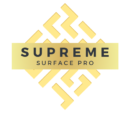Introduction
While epoxy flooring is a top choice for transforming a garage, it’s not the only solution. For some homeowners, business owners, or DIY enthusiasts, other options might better suit their needs, budget, or aesthetic preferences. From do-it-yourself friendly tiles to high-performance coatings, a variety of alternatives can protect your concrete and enhance the look of your space.
This article explores the most popular and effective alternatives to epoxy flooring. We’ll examine the pros and cons of each option to help you decide which one is the perfect fit for your garage.
1. Polyaspartic Coatings: The Next-Generation Alternative
For those who love the seamless, glossy look of an epoxy floor but want even better performance, polyaspartic polyurea coatings are the answer. This is the closest alternative to epoxy in terms of appearance and function, but with several key advantages.
Pros:
Rapid Curing Time: This is the biggest selling point. Polyaspartic coatings can cure in a matter of hours, allowing you to walk on the floor the same day and drive on it within 24 hours. This is a huge benefit for busy households or businesses.
Superior Durability: Polyaspartic is 3-4 times more durable than epoxy, with exceptional resistance to abrasions, impacts, and chemicals. It’s also more flexible, making it less prone to cracking in climates with significant temperature fluctuations (e.g., freeze-thaw cycles).
UV Stability: Unlike standard epoxy, polyaspartic is UV-stable and will not yellow or fade over time when exposed to sunlight, making it ideal for garages with large windows or doors.
Cons:
Higher Cost: Polyaspartic materials are more expensive than epoxy, and the specialized, quick-curing nature of the product often requires professional installation, raising the total cost.
Fast Application: The quick curing time means the installer has a very short “pot life” (the time the material is workable). This requires a highly skilled and efficient professional, as mistakes are difficult to fix.
2. Polished Concrete: The Sustainable, Modern Choice
For a more natural, minimalist aesthetic, polished concrete is an excellent option. As we discussed previously, this is a mechanical process that transforms the concrete itself into the finished floor.
Pros:
Extreme Durability: Since there is no coating to chip or peel, a polished concrete floor is incredibly resilient and can last a lifetime with minimal maintenance.
Eco-Friendly: It utilizes the existing concrete slab, reducing waste and the need for new materials.
Low Maintenance: Polished concrete is incredibly easy to clean, requiring only a simple sweep and occasional mop. It also eliminates concrete dusting.
Cons:
Aesthetics Depend on Existing Slab: The final look is dependent on the quality of your existing concrete, including its color, aggregate, and any imperfections.
Not as Chemical-Resistant: While densifiers make the floor less porous, it is not as chemical-resistant as a sealed coating like epoxy or polyaspartic. Spills from oil or acid can stain the surface if not cleaned up promptly.
3. Interlocking Garage Floor Tiles: The DIY-Friendly Option
For homeowners who prefer a project they can tackle themselves, interlocking floor tiles are a popular choice. They are available in various materials, including plastic (polypropylene), PVC, and rubber.
Pros:
Easy DIY Installation: The tiles snap together over your existing concrete, requiring no special tools or adhesives. They can often be installed in a single afternoon.
Hides Imperfections: Tiles are great for covering up cracked, stained, or uneven concrete floors without extensive preparation.
Customization: Tiles come in a variety of colors, allowing you to create custom patterns, checkerboards, or race-track designs.
Portability: Tiles can be easily uninstalled and moved if you change homes.
Cons:
Not a Seamless Surface: The seams between the tiles can trap dirt and debris, making cleaning more difficult. Water and spills can also seep through the seams and get trapped underneath, leading to mold or mildew.
Less Durable than Coatings: While tiles are generally durable, the seams are a weak point, and a heavy dropped object can crack a single tile. The tiles can also shift or buckle with temperature changes.
Higher Upfront Cost: High-quality interlocking tiles can be expensive, with the price per square foot often rivaling that of a professionally installed epoxy floor.
4. Garage Floor Paint: The Most Budget-Friendly Choice
For a quick and cheap cosmetic upgrade, concrete floor paint is the most affordable option. It is not the same as epoxy paint and does not contain the same resins and hardeners.
Pros:
Low Cost: It is by far the cheapest solution, and the materials can be purchased at any home improvement store.
Simple Application: It can be applied with a roller and a brush, similar to painting a wall.
Wide Color Selection: Comes in a wide variety of colors.
Cons:
Poor Durability: Concrete paint is not a long-term solution. It is prone to peeling, chipping, and flaking, especially from hot tires and traffic. It offers very little protection against stains.
Frequent Reapplication: You will likely need to repaint the floor every 1-2 years, making it a higher-maintenance option in the long run.
Aesthetics: The finish is usually a thin, flat color with no depth or gloss.
Final Recommendation
Choosing the right garage floor solution is a balance of your needs.
For ultimate performance and long-term value, a polyaspartic coating is the top-tier choice.
For a durable and modern aesthetic that is environmentally friendly, polished concrete is a fantastic option.
For a simple, low-commitment DIY project that can be installed quickly, interlocking tiles are a great solution.
For a quick and temporary cosmetic refresh, concrete floor paint is your budget-friendly choice.
Ready to find the right flooring solution for your garage?
Contact us for a free, no-obligation consultation! We can help you weigh the pros and cons of each option and provide a professional recommendation and quote.
